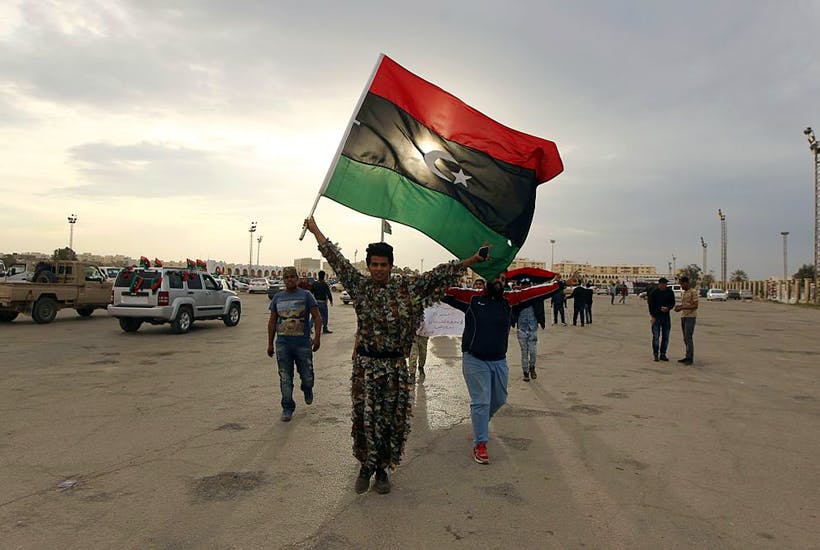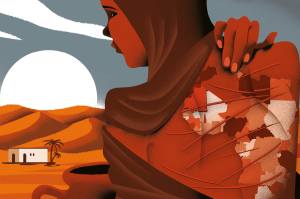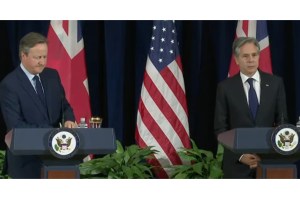The European Union already has a lot on its plate. The continuing doom of Brexit, upcoming parliamentary elections, a resurgent and ever strident nationalist movement across the continent and migration to name only a few. But following the last week, Libya can be added to the list. The armed conflict just across the Mediterranean is splitting the EU. Not for the first time, it makes the institution look floundering, divided and unsure of its capacities.
Libya has been a basket-case ever since a Nato and Arab-led military coalition helped the country’s rebel brigades kick Gaddafi from power. The North African nation is in reality not a nation at all, but a collective of individual militias chocked to the brim with weapons and refugees. So while general Khalifa Haftar’s advance towards Tripoli has brought the country back into the headlines, the truth is that Libya has been suffering from a civil war for the last eight years. The only difference now is that there is a military strongman to the east who has built up enough forces and cobbled together enough tactical alliances to storm the gates of the Libyan capital in an attempt to unify the entire country under his command.
The chances of this happening, of course, are slim. Haftar—a 75-year-old general who helped Gaddafi seize power in 1969 before turning on him over a decade later—is the quintessential military man who has no patience for thieving and ineffective politicians. He believes all men in suits are useless and that only a military regime under his tutelage will be able to kill off the terrorists running rampant in Libya and eliminate the militias plundering Tripoli. If his forces remain bogged down in the suburbs, his delusions of grandeur may eventually be his undoing.
To the Europeans, the bottom line is stopping the violence as soon as possible and making sure that another wave of refugees from North Africa don’t strap on their lifejackets and set sail for Europe’s southern shores. For the centrist parties hoping to stave off a nationalist wave in next month’s EU parliamentary elections, tens of thousands of additional refugees being rescued and brought to Europe is gold for the likes of Italy’s Matteo Salvini, a man who is in the process of forging a right-wing, Eurosceptic alliance to challenge the usually dominant establishment. Indeed, for all of Europe’s divisions, there is at least one theme everyone can agree on: Libya cannot be allowed to descend into even more anarchy.
European governments are all calling for the violence to stop and for Libya’s two rival governments to cooperate with UN-facilitated peace negotiations. But how to do it remains a stumbling block for Europe. The EU’s inability to agree on a statement last week calling for a cessation of hostilities exposed the fecklessness that is rotting at the heart of the bloc.
It certainly doesn’t help that Italy and France, who have been at each other’s throats over everything from migration to the yellow jacket uprising in Paris, have opposing interests in the large North African state. For Rome, the two top objectives are ensuring calm prevails and that its former colony doesn’t become an even greater springboard for more irregular migration. Paris, however, is focused mainly on its oil assets to the east and on counterterrorism. Both France and Italy have an interest in seeing peace in Libya, yet they are in many respects on the opposite sides of the Libyan power struggle. The Italians remain supportive of the UN-backed Libyan Government of National Accord, while the French have actually deployed special forces to fight alongside Hifar’s Libyan National Army against jihadists in Benghazi. You don’t have to be Henry Kissinger to understand why that is a significant problem.
The ongoing Libya civil war is first and foremost a crisis for the Libyan people, 13,500 of whom have been displaced by the fighting since April 4. But the chaos across the Mediterranean is also a test for the European Union, an institution seemingly under siege from all directions. The central question – can Brussels be a major player in the world on par with the United States and China?—is still not determined.
With an administration in Washington tired of pulling Europe’s bootstraps across their backs and increasingly frustrated with the continent’s welfare mentality on defense spending, European leaders may soon face a future when they can no longer count on the Americans to bail them out of pesky situations. When push comes to shove, the Europeans will have to find a way to resolve conflicts on their own—particularly those in their immediate neighborhood.
Libya would be a good opening act. Unfortunately, the EU isn’t exactly showing its finest colors.
This article was originally published onThe Spectator’s UK website.


















